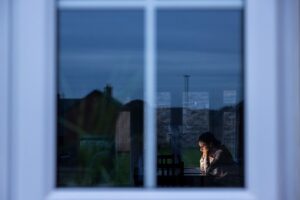The Rise of the Female Gambling Addicts
Stories from women like ‘I blew hundreds of thousands playing online bingo – then I tried to kill myself’ etc. are fast becoming rampant these days.

‘The gambling landscape has significantly shifted and evolved in the past decade or so, mostly due to the rise of accessibility and availability of online gambling,’ Zoe Osmond, chief executive of GambleAware, told Metro.co.uk.
NHS employee Bev’s Story:
Bev who had never gambled before, saw an advert on her laptop that was colourful, shiny, and it looked like a bit of harmless fun, and so, without giving it much thought, she decided to deposit a ten pound bet.
Bev, who lives in Newcastle-upon-Tyne, didn’t win anything that first time. But she decided to have another go. And then another. Very quickly, she won £800 and couldn’t believe her luck.
However, what she didn’t realise that night was her ‘lucky streak’ would lead to a ten year gambling addiction and nearly cost her everything – including her life.
Bev is married with a daughter. At home, she was spending all her time on the computer, but they had no idea what she was doing.
Eventually, she ran out of sources for money – she, and by default her husband, were up to their eyes in debt. Bev was in charge of the bills they weren’t getting paid, and things got to the point where she had to ask for help.
However, despite trying several times to give up, the sites kept enticing Bev back in.
She was depositing so much money – hundreds at a time – that she became known as a ‘VIP’. This meant that, when she hadn’t played for a few days, she would start getting emails offering her free money to get extra plays – sometimes to the value of hundreds of pounds. ‘I had a good job and I was making around £2,200 after tax – sometimes more. But at the end of every month, I would find myself sitting up until midnight on payday, so I’d see my wages go in. I’d blow the whole lot that night.’
The NHS employee estimates that she’s gambled hundreds of thousands in total over the years. ‘I had a hundred grand in credit card debt alone, never mind all the loans from friends and family,’ she says.
Not long after opening up to her family, Bev found herself taking out more secret payday loans, and defaulting on bill payments again. However, the impact wasn’t all financial – as it rarely is.
Gambling in secret took a massive toll on her mental health, her physical health, and her relationships. Her marriage started to suffer, with her husband ‘on the edge of a nervous breakdown’.
Then, on Christmas day 2016, it all came to a head. Bev decided to put a bet on. ‘My logic at the time was, “surely they won’t let you lose at Christmas?”‘’ she says.
‘Within 45 minutes I emptied my husband’s account and blew £5,000.
‘I then took an overdose. That night was when I realised I couldn’t carry on like this anymore. I just didn’t want to be alive anymore.’
Bev is one of a huge number of women who are classed as ‘problem gamblers’ – and it’s a figure that’s growing.

Tracy Galvin’s Story.
Tracy who lives in Essex, says that her addiction made her feel like she was two different people. ’The Tracy who was gambling and the Tracy who was trying to cover it up. It was like having a split personality,’ she explains.
Introduced to gambling at the age of 17, Tracy would play the slot machines, after finishing a shift in the bingo hall she worked in.
Tracy, 58, experienced her first big win one night after she finished work, when she won £250 – a moment she recalls as a turning point.
From there, things escalated, and the slot machines quickly became something that she would turn to for escape and comfort. She describes gambling, and the distraction that it created, to fill a void in her life and as a way of dealing with difficult things she had going on.
Tracy’s gambling addiction caused her to have two nervous breakdowns.
Tracy was working three jobs in order to fund her habit, leaving the house at 7am and getting home at 1am. In between, all she could think about was gambling.
‘At the age of 40, she has had seven strokes, and spent a year in hospital. I fully believe that this was caused by the emotional damage it was doing.’
After reaching breaking point, Tracy finally went to her first support group.

Jemima’ Story
Jemima aged 35, started gambling after becoming a young mum.
Her ex-husband was an alcoholic, drinking every day. Jemima felt that it wasn’t safe to leave her son in his care and was therefore unable to leave the house.
However, feeling ashamed of her situation, she didn’t ever confide in anyone. She was lonely and one night online, she decided to try bingo.
For Jemima, it was a form of escapism – and it also became a replacement for the social life that she was sorely missing.
‘At the beginning it was fun,’ she admits. ‘You had a chat forum where you could talk to other people who were playing. It was like a network of friends, and it felt like an alternative to a night out.’
‘It didn’t even feel like real money, it just felt like a number on a screen,’ admits Jemima.
However, struggling to cope with the loneliness and difficulties of her life, Jemima soon found herself gambling constantly and obsessively.
What started out as £10 or £20 bets gradually became deposits of up to £600 at a time. In the end, she estimates that she gambled well over £100,000.
‘It didn’t even feel like real money, it just felt like a number on a screen,’ she admits.
Jemima says her life had deteriorated before her eyes but she couldn’t stop. That’s when she turned to crime to fund that gambling habit.’
Desperate for more money to feed her addiction, Jemima committed fraud, illegally accessing and spending money from a friend’s bank account. On finding out, her friend then reported the fraudulent activity to the police.
When Jemima found this out, she turned herself in.
After ten months on bail, which Jemima used to try and sort out some of her debt and make sure her son would be ok, she served a total of nine months in custody, and four months on a tag.
Upon her release, she got help from charity Bet Know More UK, who she says were pivotal in getting her life back on track. After volunteering with them, she was offered a job and now uses her experience to help others.

HELP For Problem Gamblers
Liz Karter, MBE is a gambling addiction counsellor and psychotherapist with over 22 years’ experience supporting women. She has also published three books on the topic of gambling, addiction and women.
Liz has seen women lose everything.
These are women with high-flying jobs, and people who – from the outside – look as though they’ve got it all.
‘It’s not true that people who are less knowledgeable about how to manage money are more susceptible. Lots of the women I treat are from financial backgrounds. I also see doctors, accountants, lawyers. Mainly, it’s driven by escapism.’
Liz stresses that she’s seen people lose everything, their homes, their marriages, their life’s savings – and in some really sad cases their children,’ she says. ‘You name a figure, I’ve seen it.’
But it’s not just about trying to win money, explains Liz. Gambling addictions are often a result of people trying to fill a void or distract themselves from other problems.

Statistics from GambleAware
The number of women gambling online has risen by over 50% over the past four years. This is almost double the growth rate of men over the same period of time.
‘And with the latest data showing that up to one million women may be at risk in the UK of experiencing some sort of harm as a result of gambling -be it financial, emotional, or in terms of impacting their relationships with loved ones and leading to isolation – it’s critical to drive awareness around early warning signs, such as losing track of time, spending too much, or a tendency to hide gambling from others.’
Many women are drawn to online gambling, such as bingo or casino games, as the games are often perceived as more innocent and familiar. They appear very similar to the seemingly innocuous digital games we’re used to playing on our phones and, in a similar way, become a form of escapism.
A recent report discovered that much of this promotion is found to be especially targeted at women, tending to portray gambling as innocent social fun – and for lotteries, as ‘a national pastime’, ‘for people like us’, or about supporting communities.
Research from GambleAware has found that women experience gambling very differently to men, all the way from their initial motivation through to how they experience harms and how they might seek treatment.
‘We also know that women are more likely than men to say their gambling has caused them mental health issues such as stress and anxiety,’ adds Osmond.
Following their gambling addiction, Tracy, Bev and Jemima have all received help, and all have turned their lives around, coming back from rock bottom.
They each wanted to stress that help is out there for people who are struggling, or who think they might have a problem.
The more women that come forward, the more we normalise asking for help. I want people to know that you can get your life back, like I did, said Jemima.
Source: The Metro.co.uk





